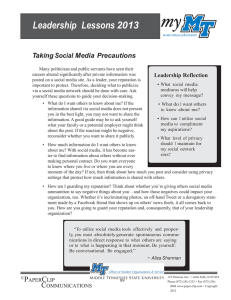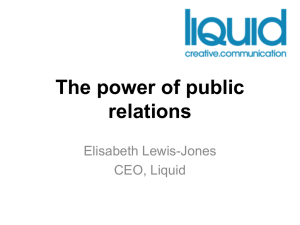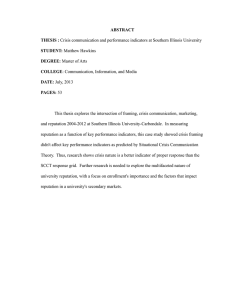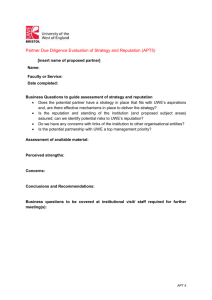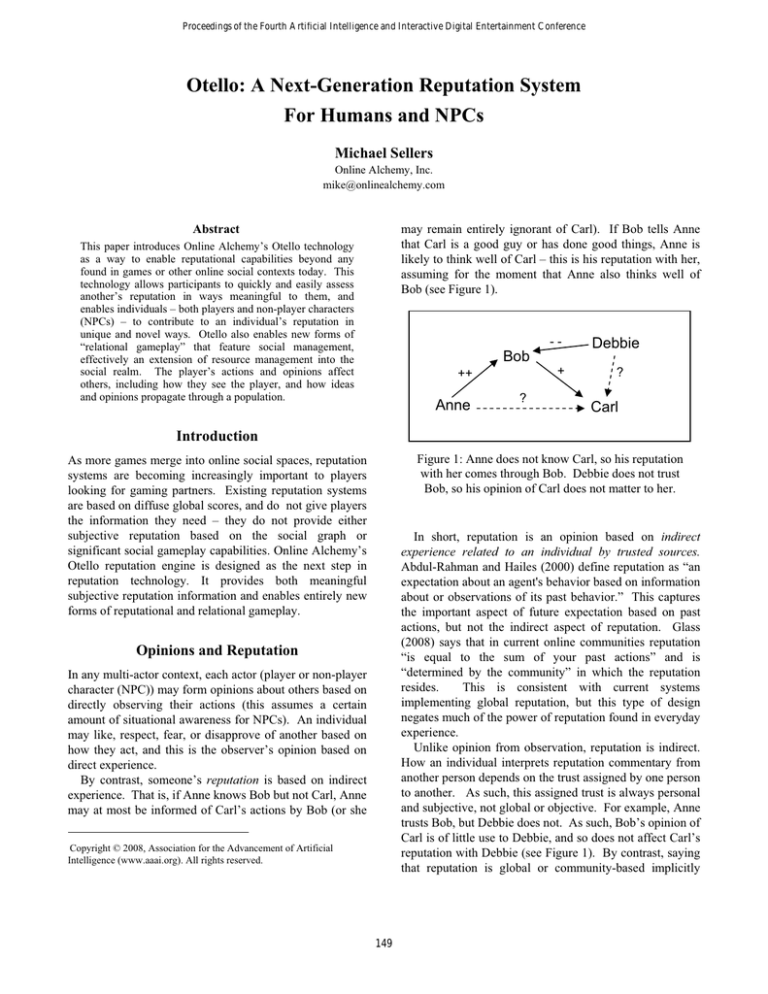
Proceedings of the Fourth Artificial Intelligence and Interactive Digital Entertainment Conference
Otello: A Next-Generation Reputation System
For Humans and NPCs
Michael Sellers
Online Alchemy, Inc.
mike@onlinealchemy.com
may remain entirely ignorant of Carl). If Bob tells Anne
that Carl is a good guy or has done good things, Anne is
likely to think well of Carl – this is his reputation with her,
assuming for the moment that Anne also thinks well of
Bob (see Figure 1).
Abstract
This paper introduces Online Alchemy’s Otello technology
as a way to enable reputational capabilities beyond any
found in games or other online social contexts today. This
technology allows participants to quickly and easily assess
another’s reputation in ways meaningful to them, and
enables individuals – both players and non-player characters
(NPCs) – to contribute to an individual’s reputation in
unique and novel ways. Otello also enables new forms of
“relational gameplay” that feature social management,
effectively an extension of resource management into the
social realm. The player’s actions and opinions affect
others, including how they see the player, and how ideas
and opinions propagate through a population.
++
Anne
Bob
?
-+
Debbie
?
Carl
Introduction
Figure 1: Anne does not know Carl, so his reputation
with her comes through Bob. Debbie does not trust
Bob, so his opinion of Carl does not matter to her.
As more games merge into online social spaces, reputation
systems are becoming increasingly important to players
looking for gaming partners. Existing reputation systems
are based on diffuse global scores, and do not give players
the information they need – they do not provide either
subjective reputation based on the social graph or
significant social gameplay capabilities. Online Alchemy’s
Otello reputation engine is designed as the next step in
reputation technology. It provides both meaningful
subjective reputation information and enables entirely new
forms of reputational and relational gameplay.
In short, reputation is an opinion based on indirect
experience related to an individual by trusted sources.
Abdul-Rahman and Hailes (2000) define reputation as “an
expectation about an agent's behavior based on information
about or observations of its past behavior.” This captures
the important aspect of future expectation based on past
actions, but not the indirect aspect of reputation. Glass
(2008) says that in current online communities reputation
“is equal to the sum of your past actions” and is
“determined by the community” in which the reputation
resides.
This is consistent with current systems
implementing global reputation, but this type of design
negates much of the power of reputation found in everyday
experience.
Unlike opinion from observation, reputation is indirect.
How an individual interprets reputation commentary from
another person depends on the trust assigned by one person
to another. As such, this assigned trust is always personal
and subjective, not global or objective. For example, Anne
trusts Bob, but Debbie does not. As such, Bob’s opinion of
Carl is of little use to Debbie, and so does not affect Carl’s
reputation with Debbie (see Figure 1). By contrast, saying
that reputation is global or community-based implicitly
Opinions and Reputation
In any multi-actor context, each actor (player or non-player
character (NPC)) may form opinions about others based on
directly observing their actions (this assumes a certain
amount of situational awareness for NPCs). An individual
may like, respect, fear, or disapprove of another based on
how they act, and this is the observer’s opinion based on
direct experience.
By contrast, someone’s reputation is based on indirect
experience. That is, if Anne knows Bob but not Carl, Anne
may at most be informed of Carl’s actions by Bob (or she
Copyright © 2008, Association for the Advancement of Artificial
Intelligence (www.aaai.org). All rights reserved.
149
assigns equal trust to all actors in the community, which in
most cases is socially an unwarranted position.
While trust is personal and subjective, it can be inherited
transitively with some loss due to “friction” of indirect
social contact. Even if Anne trusts Bob, she will be less
confident of Bob’s opinion, and thus of Carl’s reputation,
than if she knew Carl directly. Carl’s opinion matters less
to Anne that does Bob’s, but more to her than someone
with whom she has no relationship. This transitive
decrease in trust is known as a continuous (rather than
binary) discounting factor in subjective logic (Jøsang
1997), and allows opinions and reputation to spread
throughout a social network in proportion to their
relevance, without doing so infinitely.
Since trust is always personal and imperfectly transitive,
reputation is also personal and subjective. This is an
important aspect of social relationships that we each
encounter every day, and yet which is not included in
existing reputation systems. An individual like Carl in the
previous example may be well thought of in some circles
and very poorly thought of in others. Given this, it is not
sufficient in creating a useful social model to assign a
single, objective, global number to Carl and call that his
reputation. His reputation is inherent in and subjective to
those considering him, not contained in or attached to
himself. Enabling this subjective view technologically
opens the door to having, for example, Montagues and
Capulets, where one individual may be seen differently by
two (or more) formal or ad hoc groups.
This nonmonotonic nature of reputation is something not found in
existing systems and yet is crucial for effective relationship
modeling in social and game contexts. It enables both
more informative matching systems as well as entirely new
forms of gameplay, as discussed below.
on a simple average of submitted values. In some systems,
notably Slashdot’s, ratings are culled from a subset of the
entire community, but even here these are taken from an
essentially random grouping without reference to the
relationships between individuals.
The second primary type of reputation systems are
authority-based, such as Advogato or Venyo. In these
systems there are authoritative individuals who act as
vetting nodes in a social graph: the originators are granted
“most trusted” status, and assign levels of trust to others.
Each individual can assign to others levels of trust less than
or equal to their own, thereby excluding bad actors,
assuming no mistakes are made. This type of system is
analogous to the credit reporting system used in the US,
where individuals have a global score attached to them by
presumptive trusted agencies.
As in global-average
systems, each individual has a single score that is the same
no matter who is evaluating them.
Reputation systems in games have been employed at
least since Sid Meier’s Pirates (MicroProse 1987) where
based on their actions players could affect their standing
with different nations, and more recently in games like
Oblivion (Bethesda Softworks 2007) and Fable (Microsoft,
2004). In many massively multiplayer online games
(MMOGs) such as World of Warcraft (Viviendi 2004)
players gain or lose reputation with non-player factions
based on certain (typically quest-based) actions, but these
games do not tend to have player-player reputation
systems.
Problems with Existing Reputation Systems
While existing reputation systems in social and game
settings have become widespread, they also have a number
of serious issues that limit their utility.
Identity issues Most reputation systems assume that every
individual has a single stable, known identity.
Unfortunately in these systems it is often easy to create
fake identities. These can be used to gang up on another
person or add fictional support to the user’s primary
identity (so-called ‘bombing’ and ‘Sybil’ attacks (Douceur
2002), respectively). Both forms of “anonymity without
responsibility” distort an individual’s reputation by the
creation of false data.
Current Reputation Systems
Existing reputation and rating systems fall into one of two
types: either they create global reputations based on the
averaged opinions of all commentators, or they use
centralized authorities to create global reputations inherited
by all observers. In either case, reputation is currently seen
as a single quantity or score inherent in the targeted
individual, and that is seen the same by all observers.
Examples of global-average reputation and rating
systems include those used by online sites like eBay,
Slashdot, iKarma, Digg, Orkut, and Xbox Live. eBay is in
some ways the canonical global reputation system, in that
an individual’s reputation there depends on the averaged
opinions of everyone who chooses to submit a rating. In
such systems each individual typically has one numerical
rating (though sometimes this number is hidden behind
text covering an interval of ratings), and the rating is based
Spurious and negative ratings In any global aggregation
system, bad actors can create negative results that have no
basis, but which persist and are viewed by others who have
no context for the rating. The reverse can also cause
issues, where individuals are reluctant to supply negative
ratings if doing so would put them at risk socially. For
example Resnick and Zeckhauser (2002) note that “the net
feedback scores that eBay displays encourages Pollyanna
150
assessments of reputations, and is far from the best
predictor available.”
This issue can be exacerbated by “reputation bombing”
where individuals expressing opinions out of line with the
mainstream are “bombed” into either submission or
irrelevance by piling on many negative ratings by others.
In some cases this approaches a form of social extortion by
so-called “trustitutes” (as on sites that pay a nominal
amount for opinions that are well-regarded by others) who
will support you if you support them, but who will marshal
others to exclude you if you do not comply (Epinions
2004).
opinions are subjective and include continuous rather than
discrete rating and confidence measures.
Applying
confidence as a form of trust transitively and
accumulatively across a social graph enables the creation
of a singular, subjective opinion and confidence measure.
This reputation value represents a subjective view of an
individual or piece of online content. Instead of “what
everyone thinks” of someone or some thing, each
individual sees a weighted aggregation of what their social
network thinks. Thus, a single individual such as Romeo
Montague or Paris Hilton will be seen as important or
irrelevant and with different degrees of assurance by
different people. Such individuals have entirely different
reputation values based on the weighted opinions of people
in different social networks.
Otello does not use any estimating algorithms to predict
what people might think, nor does it depend on centralized
or imposed global values. The global reputation value for
any person or content can be computed, but this is typically
of less value than the opinions of an individual’s social
network. Nor does Otello depend only on first-rank
‘friends’ as in many existing social networks. A reputation
score is built from the recursive aggregation of the
opinions of those whom you trust, and those whom those
people trust, continually expanding outward until there is
insufficient confidence to use additional opinions in the
network.
Opinion convergence In any reputation system that
depends on global or authoritative opinions, there is no
room for divergence of opinion. If “everyone” thinks an
individual or content item is great, those who disagree are
effectively silenced; at most their opinion may change the
aggregate value slightly. In other words, there is no room
for valid differences of opinion or clusters of interest: if the
mass of opinion says that a particular individual, movie,
guild, or song is the best ever, other opinions become
invisible.
This is particularly apparent in authority-based systems
such as Advogato. Once an individual is assigned a high
trusted status it is all but irrevocable, no matter how much
others may disagree. This became starkly apparent in the
celebrated ‘Mentifex’ example, where an individual
somehow achieved Master or ‘most trusted’ status despite
the objections of others in the community (Taylor 2007).
This convergence of opinion also leads to the devaluing
of contrary opinions, in that individuals who disagree have
no incentive to speak up or act because of the perception
that their opinion cannot change anything.
Model and Usage
Otello is an engine that does not specify a single user
interface, but the basic functions remain the same across
installations. In using Otello, each individual can state
their opinions via ratings along with optional tags. Each
rating consists of a value and confidence, indicating an
opinion and how sure the rater is about that opinion. Both
are continuous values and can be represented in numerous
ways, including numbers, stars, colors, etc.
Opinion ratings can be created about other individuals or
things – blogs, guilds, in-game items, etc., depending on
the context. Opinion ratings can also be made on tags
themselves to rate an general topic: if an individual dislikes
politics, he or she can rate the tag itself low, which has the
effect of reducing the effective rating on all opinions
carrying the tag ‘politics.’
As individuals rate each other and items, Otello
constructs an internal social graph of one-way opinion
links. Positive values indicate increasing trust and interest,
while increasingly negative values indicate interest without
trust. Values near zero indicate a lack of interest and no
particular trust on the part of the rater. Low confidence on
a link indicates a tenuous opinion, while high confidence
indicates more assurance on the part of the rater.
Otello and Dynemotion
Online Alchemy has been developing an advanced form of
agent-based artificial intelligence for use in games since
2002. As part of this, the company has created the
Dynemotion People Engine, a system that creates agents
with their own personalities, emotions, and goals, and that
learn and form opinions and relationships with others
around them. These agents remember and learn from what
they experience first-hand, and pass on to each other their
own memories and those told to them by others. This
capability formed the core of Otello, a reputation engine
suitable for use in games and social environments, and
which enables reputation to be accrued and transmitted
between players and non-player characters.
Otello is modeled on information flow and the semantics
of trust in human relationships in a computationally
scalable way. As noted above, Otello uses a form of
subjective logic to codify opinions and reputations. All
151
Using this method, “friends” are those with whom you
share bi-directional positive ratings. Rating someone
highly where this link is not reciprocated indicates a
“subscriber” or “fan” relationship. Individuals with many
more inbound than outbound links are social hubs with a
certain amount of celebrity. Note that each individual can
choose to make their opinion visible to others or not, so
there is no social repercussion to not rating someone or
rating them negatively.
their opinions to themselves, their friends, or those in a
particular group. This way Bob can keep his opinion of
Debbie to himself, only let his trusted friends see his
opinion of Carl, and keep his interests in international
affairs and action figures separate for only individuals in
those particular interest groups.
Benefits
Otello enables users to record their own opinions of online
or in-game items, posts, people, etc. and to see the opinions
of those whom they trust in individual or aggregated form.
Visible opinions include those from their friends as well as
popular authors or in-game leaders. Reputational ratings
are based on each individual’s outlook and not on any
enforced global or authoritative ratings.
Network Search Using the social graph made up of
individuals’ ratings, the Otello engine can perform usercentric network searches to provide subjective accumulated
reputation values.
The engine searches the user’s
outbound positive links, and then those nodes’ outbound
links recursively until the confidence value falls below a
minimum threshold where no more useful information is
available. This is a model of ‘social distance’ where you
are unlikely to put much stock in your friend’s friend’s
friend’s opinion. The use of this kind of discounting factor
also ensures that any network search is finite no matter the
connectivity in it.
Note that outbound negative links are not used in
personal network searches; rating someone poorly
effectively reduces or removes their opinion (and that of
those whom they value) from your consideration. In other
words, you care what your friends’ friends think, but not
what those whom you don’t trust think.
As the engine searches the user’s network, it avoids
looping back (the network is likely a graph with many
cross-connections) as it aggregates all relevant opinions.
These opinions are weighted by value and confidence
based on the connections between the user and the node
being searched.
The network search can return a value about a specific
person or item (“what does my network think of person X,
or about this new movie?”), or it can return a ranked list of
the most important people and/or items in your network.
In this way, Otello acts like a personalized content rating
system, where the rankings seen are based on the trust
assigned by the user, not on what “everyone” or even just
“your friends” think.
Security Each individual’s opinions are secure and
discreet: no one can change another’s opinions, and each
individual can choose how public to make their opinions.
Further, no one can be “bombed” or otherwise coerced into
changing their opinion, as any such social bullying can be
made irrelevant by simply rating the intimidator poorly;
this removes their opinion (and their coterie’s opinion)
from your ratings and the ratings of anyone who values
your opinion. Those who are rated poorly by many others
find their ability to affect them essentially eliminated,
meaning that negative social actions become inherently
self-limiting.
In a similar way, attempting to increase the popularity of
an identity by using other fake identities (a Sybil attack) is
futile, since the opinions of the fake identities first have to
be valued by others to have any effect. Overall an
individual cannot cede trust to anyone else, and is therefore
not affected by the opinion of anyone else, unless they
choose to do so.
Publish and Subscribe Opinions that an individual makes
public are passed effortlessly to their friends and others
interested in their opinion. For example, an individual who
finds a blog post that they find important has only to rate
the story, and it will appear as important to all others
interested in their opinion (modified by the opinions of
anyone else in their network who also rated it).
Similarly, rating and tagging an individual in a game as
a valuable party member (or conversely, as a ninja-looter)
makes this information available to everyone who is linked
to you, and by extension all those two or more degrees
separate from you. A player can thus find out what his or
her friends and their friends think of someone before
inviting them to join their game, party, or guild.
Global Search In some cases it is preferable to search the
entire network for an aggregated opinion or a “top ten” list.
In particular, when a new user joins the system and is not
yet embedded in their own social network, this provides
them a way to see what others think is interesting, and to
begin creating their own opinions and network.
Individual Opinions A user can always see and change
their own opinions, query what another user thinks about a
person or item, or what that person has rated recently. This
becomes like a blog of ratings and a repository for
opinions. Individuals can choose to limit the visibility of
No Spam Otello also eliminates social spam of the “be
my friend” type so often seen on social sites and in games.
Having “more friends” whom you don’t know is
meaningless. Each person links to others because they see
152
value in them, but what matters is linking to people whose
opinions each person finds important, not the number of
people in a friends list. Linking is done without a
reciprocating responsibility in the person linked to, just as
with subscribing to their blog.
if the other is worth playing with, bringing into a party, or
asking for help.
In both single- and multi-player settings, non-player
characters (NPCs) also become key actors on the social
landscape. Now NPCs are not simply vending machines;
they can not only react to what they see a character do, but
pass this information on to their fellows. So if you cheat
one shopkeeper, others may soon be on the lookout for you
– while the head of the rogues’ guild might offer you a job.
In other contexts, NPCs and PCs together can deal in
rumors and noisy backchannels, with opinions passed
along trusted lines. Or in a different setting, PCs and
NPCs can attempt to influence public opinion and thus
change styles and fashions based on affecting the opinions
of those in overlapping trusted networks. Finding the early
adopters and influencers in the game population becomes
an aspect of gameplay.
NPCs can pass opinions to those in their social network
directly, while PCs and NPCs can pass opinions tacitly
through chat or other social proximity (belonging to the
same guild for example). For example, if a player has a
poor opinion of a particular character, there is a chance that
this opinion will “rub off” on those with whom he talks or
spends time. Thus, without affecting anyone’s ability to
set their own opinions, players who hang out together or in
a particular part of town will all begin to have similar
opinions. Social ideas, memes, fads, and fashions are all
passed between players and between PCs and NPCs,
creating a diverse, interesting social fabric within a game
that can be exploited for gameplay purposes.
This has significant benefits for players beyond lifting
social play out of just “chatting.” Players who have the
talent to cultivate the right social connections are as
valuable in their own way as those who can swing a sword
or shoot a gun. Such players will begin to feel socially
competent and connected to their social network in the
game, making them feel more immersed in the game and
likely to stay around longer.
Games can also explicitly reward players who fill social
roles such as being a social hub, a connector between
diverse groups, a popular leader, etc. All of this is
discoverable from the shape of the social graph even if it is
not obvious to the players, and game operators can use the
structure of the social graph to award badges, skills, or
other rewards for social contribution.
Operator Benefits Finally, Otello provides benefits to
the game operator in terms of analyzing the social
landscape inside the game. This can be used to find the
leaders and early adopters and to see how ideas and ratings
spread throughout the population, but also to find, localize,
and remove those players who introduce cheats or other
destabilizing factors into the game.
Potential Issues
As mentioned above, Otello avoids or withstands most of
the issues affecting existing rating and reputation systems
by making use of the same semantics of trust we use in our
daily lives. Tactics like reputation bombing or Sybil
attacks are fruitless.
The primary issue still open in the use of Otello is the
violation of formerly earned trust. A highly influential and
trusted person can turn that influence against others by
rating them poorly in a malicious manner. While this is an
issue in any form of powerful relationship, in an Otelloenabled environment the spurned users at least have the
equal ability to limit the damage by rating the formerly
trusted rater negatively, thus eliminating his or her opinion
from their view of the world. The violation of anyone’s
trusts becomes a self-limiting action, as others will quickly
stop listening to the violating individual’s opinions too.
The other primary potential issue is one of scalability.
Otello performs repeated spreading recursive network
searches, which can be computationally intensive. Our
scale tests indicate that Otello’s Java implementation can
handle rich networks ranging to several hundred thousand
people and items per CPU with sub-second response time.
Additional scaling mechanisms can be used as needed.
New Gameplay
Creating a social graph including human relationships and
trust sets the stage for new forms of gameplay that will be
compelling to a wide range of users. In effect this makes
the social landscape – who knows whom, and who is
respected by whom – part of the game. Games can be
about more than who can hit fastest or hardest; now it’s
about who is more respected, more loved, or more feared.
Players in a multi-player setting can become known for
how they play, both in terms of a reputational score and
tags that others apply to their avatar. Upon meeting a
person for the first time, one player can assess another
based on the opinions of their trusted network, and decide
Non-Game Uses
Otello has many uses alongside and apart from games as
well. In general, Otello is suitable for use in any situation
with a social component where individuals have long-term
identities and are likely to interact multiple times. In a
marketplace where identities are fluid or most people
153
interact only once, the ‘trusted network’ approach of Otello
may not be appropriate. In these cases defaulting to
community-wide reputation may be the only choice.
However, in many contexts such as online communities
or game lobbies, Otello enables users to make better
decisions based on the experiences of others. For example
in a game lobby, using Otello can help people find new
gaming partners from within the reaches of their social
network, using opinions they can trust. Having even
tenuous information about someone from several friendsof-friends is better than having to guess whether someone
is going to cheat, leave early, or be obnoxious without any
information at all. Having this level of information is also
a powerful disincentive for people to behave badly in
games, as now their actions have consequences that follow
them socially into future games.
As mentioned above, Otello can also be useful for
tracking opinions through a social network. Using Otello,
advertisers and others are able to identify the small
proportion of any population who consistently introduce
new elements that quickly turn viral in the overall
population, and track the spread of viral ideas through the
population. Thought-leaders, hubs, and social black holes
(those who consume information but rarely pass it along)
can all be discovered, giving the operator a much better
sense not only of the social networks in their world, but of
how ideas enter and traverse it.
Otello can also be a useful way for individuals to ask
questions without having to throw them out on the web in
general. Whether one is asking, “does anyone know a
good mechanic?” or “how can I defeat the boss monster on
Level 17?” asking this of your network rather than of some
general populace is more likely to create positive results.
From others’ point of view, only those who are linked to
you – who are interested in you, or are friends or fans of
those who are – will see your questions. Each user is able
to leverage the power of their social network with little
effort and without spamming anyone else. Moreover, any
answers provided publicly will be seen similarly, only by
those in the trusted network of people linked to the person
answering. This may help another person who had a
similar question but had not yet asked it. This can create a
positive social response, much as two overlapping
conversations in a party can bring groups together.
There are other in-game and non-game uses for Otello
that we are currently exploring. For example, we believe
there are applications in the areas of social search and safe
chat for parents and kids online. We are also interested in
exploring the creation of “opinion clusters,” emergent
groups whose members share multiple points of agreement.
This may be a powerful way to enable more satisfying
social and community experiences.
Conclusion
Otello is a unique rating and reputation system modeled on
the semantics of trust found in typical human relationships.
Unlike existing systems it does not create global reputation
values, but instead uses the opinions of those in a network
of trust to create distributed, subjective reputation values.
We have made every effort to have the technology follow
how people act rather than the reverse without giving up
computational tractability and performance.
Otello enables new ways to build and make use of one’s
social network and to make the social graph part of
gameplay in a safe and secure fashion. It also creates
entirely new forms of gameplay that go far beyond chatting
as currently seen in many online social contexts. Players
who are adept socially become as valuable as those who
are skilled in combat, and the player character’s
relationships with NPCs takes on new importance.
Finally, Otello enables new forms of discovery about the
social graph itself, and the ability to link these back to
users of the system for rewarding positive social behavior.
There remain many uses for, and new features of, Otello
that are not yet understood.
References
Abdul-Rahman, A, and Hailes, S. 2000. Supporting trust in
virtual communities. In Proceedings 3rd Ann. Hawaii Int'l
Conference on System Sciences, vol 6, p. 6007
Douceur, J. 2002. The Sybil Attack. In Proceedings for
the 1st International Workshop on Peer-to-Peer Systems
(IPTPS ’02), Cambridge Massachusetts.
The Elder Scrolls IV: Oblivion. 2007, Bethesda Softworks
Epinions 2004. www.epinions.com/content_4054884484.
Retrieved August 8, 2008
Fable. 2004. Microsoft Game Studios
Glass, B. 2008. Designing Your Reputation System.
Presentation at IASummit, Miami FL.
Jøsang, A. 1997. Artificial Reasoning with Subjective
Logic. In Proceedings of the Second Australian Workshop
on Commonsense Reasoning.
Resnick, P. and Zeckhauser, R. 2002. Trust Among
Strangers in Internet Transactions: Empirical Analysis of
eBay's Reputation System. In The Economics of the
Internet and E-Commerce, Vol. 11. Elsevier Science.
Sid Meier’s Pirates!. 1987. MicroProse Software, Inc.
Taylor, B. 2007. Advogato has Failed.
www.advogato.org/article/928.html. Retrieved August 8,
2008.
World of Warcraft. 2004. Vivendi Universal
154

